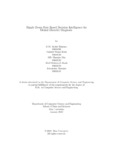| dc.contributor.advisor | Alam, Md. Golam Rabiul | |
| dc.contributor.author | Rahman, G.M. Arafat | |
| dc.contributor.author | Ibnul, Tahmid Nizam | |
| dc.contributor.author | Mia, MD. Shamim | |
| dc.contributor.author | Akash, Abid Mahmood | |
| dc.contributor.author | Banerjee, Avinandan | |
| dc.date.accessioned | 2024-01-21T05:55:57Z | |
| dc.date.available | 2024-01-21T05:55:57Z | |
| dc.date.copyright | 2023 | |
| dc.date.issued | 2023-01 | |
| dc.identifier.other | ID 19101498 | |
| dc.identifier.other | ID 19101529 | |
| dc.identifier.other | ID 19101532 | |
| dc.identifier.other | ID 19101533 | |
| dc.identifier.other | ID 19101541 | |
| dc.identifier.uri | http://hdl.handle.net/10361/22187 | |
| dc.description | This thesis is submitted in partial fulfillment of the requirements for the degree of Bachelor of Science in Computer Science and Engineering, 2023. | en_US |
| dc.description | Cataloged from PDF version of thesis. | |
| dc.description | Includes bibliographical references (pages 59-61). | |
| dc.description.abstract | Ripple Down Rule (RDR), a rule-based incremental system, enables knowledge acquisition from human experts to knowledge-based systems (KBS). The majority of modern decision intelligence systems rely on machine learning algorithms, despite the fact that most machine learning algorithms have their own limitations, such as a lack of explainability, an inability to provide multiple outputs, and poor performance with imbalanced or unbalanced data. In addition, RDR still needs to be implemented in the mental health field, and most of the current screening tests cannot diagnose multiple mental disorders at a time. Because of these issues, this paper presents an RDR-based approach for diagnosing mental disorders based on data gathered from primary sources. Since RDR is both a knowledge-based system and an inference engine where domain experts provide rules and conclusions, it can correctly explain its conclusion and provide multiple outputs using the Multiple Classification Ripple Down Rule (MCRDR). In addition, a version of the XGBoost classification algorithm called 'XGBoost Binary Classification Block' has been presented to produce multiple outputs. Comparing the experimental outcomes of three classifier models, we find that XGBoost multi-class classification has 49% accuracy, XGB Binary Classification Block has 96% accuracy, and RDR outperforms the other two by accurately predicting all outputs. | en_US |
| dc.description.statementofresponsibility | G.M. Arafat Rahman | |
| dc.description.statementofresponsibility | Tahmid Nizam Ibnul | |
| dc.description.statementofresponsibility | MD. Shamim Mia | |
| dc.description.statementofresponsibility | Abid Mahmood Akash | |
| dc.description.statementofresponsibility | Avinandan Banerjee | |
| dc.format.extent | 64 pages | |
| dc.language.iso | en | en_US |
| dc.publisher | Brac University | en_US |
| dc.rights | Brac University theses are protected by copyright. They may be viewed from this source for any purpose, but reproduction or distribution in any format is prohibited without written permission. | |
| dc.subject | Ripple down rule | en_US |
| dc.subject | Knowledge-based system | en_US |
| dc.subject | Decision intelligence | en_US |
| dc.subject | Explainable | en_US |
| dc.subject | Multiple outputs | en_US |
| dc.subject | Mental disorder | en_US |
| dc.subject | Inference engine | en_US |
| dc.subject | Domain expert | en_US |
| dc.subject | MCRDR | en_US |
| dc.subject | XGBoost binary classification block | en_US |
| dc.subject.lcsh | Machine learning | |
| dc.subject.lcsh | Artificial intelligence | |
| dc.title | Ripple down rule based decision intelligence for mental disorder diagnosis | en_US |
| dc.type | Thesis | en_US |
| dc.contributor.department | Department of Computer Science and Engineering, Brac University | |
| dc.description.degree | B.Sc. in Computer Science | |

